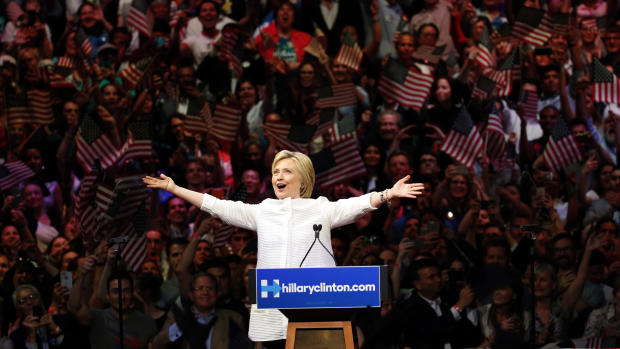Hillary Clinton's long march to the Democratic nomination
Hillary Clinton made history Tuesday when she was officially named the Democratic party nominee, the first woman in history ever to win a major party's presidential nomination.
"I move that Hillary Clinton be selected as the nominee of the Democratic party for president of the United States," Vermont Sen. Bernie Sanders said, moving to nominate Clinton Tuesday evening by acclamation at the official close of a long primary battle.
When she clinched the nomination back in June, she called it a milestone, and posted to Instagram, "To every little girl who dreams big: Yes, you can be anything you want--even president. Tonight is for you. -H."
The truth is, the former secretary of state was always the favorite to become the Democratic Party's eventual choice for president, but it didn't come easy. She was, however, ready for the task after her 2008 loss to then-Senator Barack Obama in another race where she was the early favorite.
Clinton ended her 2008 campaign in June 2015 after a months-long slog against then-Sen. Obama. He had defeated her in Iowa, and her campaign looked all but finished until her surprise win in that year's New Hampshire primary. Eventually, though, Mr. Obama got himself back on a glide path to the nomination, with then-Sen. Clinton, D-New York, finishing second in the delegate count.
"Although we weren't able to shatter that highest, hardest glass ceiling this time, thanks to you, it's got about 18 million cracks in it," she told her supporters as she exited the race.
The contest with Obama was ugly at times, but he would become one of her greatest allies, making her his secretary of state in 2009. After she left office in 2013, Clinton instantly became the early front-runner for the nomination, and her standing was such that only a handful of relatively obscure Democrats were willing to oppose her.
One of those challengers wasn't even a Democrat at all. Yet it was Sen. Bernie Sanders, a Vermont independent and self-described socialist, who quickly emerged as Clinton's main competition. After a narrow loss to Clinton in the Iowa caucus, Sanders won the New Hampshire primary in a landslide. Once trailing Clinton by as much as 50 points, he began to draw even with her in national polls, and led a youthful movement he gleefully described as a "political revolution."
Clinton was hampered by an investigation into her use of a private email server, and was considered too moderate by her party's newly-energized left wing. Sanders, meanwhile, outperformed expectations, winning a number of primaries and caucuses from Maine to Alaska and raising millions of dollars from grassroots voters.
But it wasn't enough to stop Clinton, who clinched the nomination after winning the California primary on June 7th. "Thanks to you, we've reached a milestone, the first time in our nation's history that a woman will be a major party's nominee," she told her supporters at a rally that night in Brooklyn.
A month later, Sanders formally endorsed Clinton at a rally in New Hampshire. On Monday, Sanders once again praised Clinton, telling the Democratic National Committee in Philadelphia that she would make an "excellent president."
With Democrats uniting behind her, Clinton now faces Republican nominee Donald Trump in the general election. Should she win, she will be America's first woman president. And either way, Clinton has already made history just by making it this far.
